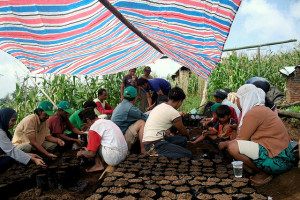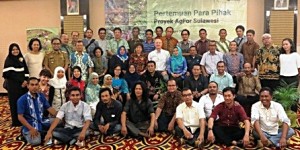
After four years, the project Agroforestry and Forestry in Sulawesi: Linking Knowledge to Action (AgFor), funded by Global Affairs Canada and the CGIAR Research Program on Forests, Trees and Agroforestry, seems to have made quite the impression because government representatives have agreed to sustain the work of AgFor beyond its end.
Entering its last year of implementation, the AgFor project held its last stakeholder meeting in April in Makassar, bringing together more than 70 government representatives from village, sub-district, district and provincial levels of South and Southeast Sulawesi, local NGOs, media, farmers and AgFor team members. They discussed exit strategies and focused how to hand over the project to the provincial governments and local organizations. Amy Lumban Gaol collected key quotes from the meeting.
“Today, we are going to present to you the project’s achievements and discuss the activities of the next eight months until December 2016. At the moment, your role as AgFor’s stakeholders is far more important than the team itself as the exit strategy should not come from AgFor.”
James Roshetko, AgFor senior team leader
“Agroforestry and forestry are related to many sectors: agriculture, fisheries, irrigation and livestock. If all of these sectors collaborate well, achieving the sustainable development goals is closer.”
Syamsu Alam, head of district development planning board, Bantaeng
“We have been greatly helped by AgFor’s presence in our district, especially with the extensionists who reached farmers in isolated and remote areas. If AgFor could be extended, we would be happy to include it in our district medium-term development work plan.”
Putri, representative of the district development planning board, Bulukumba

“I now have a joint cooperation with the Department of Agriculture and the State Agency for Research and Technology for high-quality seeds I am able to produce after a few training sessions with AgFor. Through the extension and executive board of agriculture, fisheries and forestry agency, I received money to produce taro seedlings, which will be purchased and developed by the government into an export commodity. Knowledge of agroforestry has proven to be really useful.”
Israk, a female farmer from Kayu Loe Village in Bantaeng, South Sulawesi
“AgFor just came to our district in 2014 and it is highly appreciated. If AgFor can work longer, it would be helpful for us to learn how to establish protection forests in Bangkala sub-district. We plan to replicate AgFor’s activities in Ujungbulu Village in the southern part of the district by developing a working group trained by AgFor.”
Alfian, district development planning board, Jeneponto
“AgFor should function as a trigger to simply start the mechanism and build a new system. With its restrictions and limited sources of budget and time, AgFor can’t and won’t stay forever. But we have the goodwill of the governments here to keep improving agroforestry-based incomes for smallholders. This is a very important thing to include in the provincial work plans.
Furthermore, sharing knowledge will not stop once AgFor leaves Sulawesi because all publication materials are available online and can be downloaded at anytime for free from the ICRAF website.”
Hari Basuki, representative of Global Affairs Canada
And last, but not least, Idarwati of Southeast Sulawesi and A. Misbawati Wawo of South Sulawesi appreciated the knowledge sharing of the project team through training, workshops and farmers’ field schools and recommended the project team to share all publications to district libraries in addition to the provision of links.











